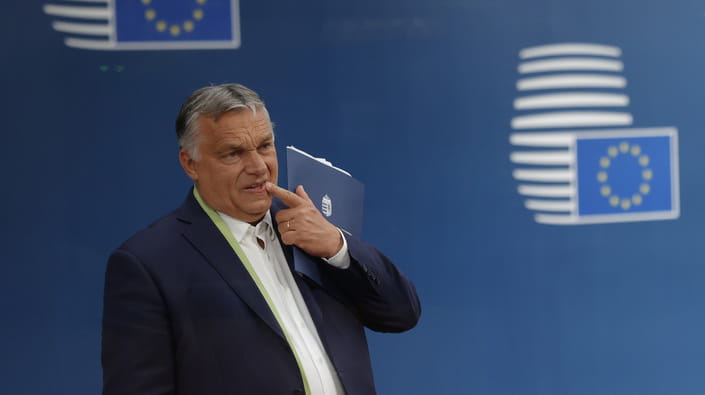Bad Copy of Russia in Hungary. How Orban Changed the EU Member into an Autocracy

Piles of partially burned (and filled-in) ballots for the Hungarian election are found at a Romanian landfill among the construction waste next to the highway connecting the Romanian town of Târgu Mureș with the town of Jedd.
This symbolic picture captures that hit headlines this week shows the very core of the last 12 years of the Viktor Orbán's hollowing out democracy, undermining the legitimacy of the elections scheduled for Sunday in Hungary. And in neighboring states, like Romania, too.
Orbán granted voting rights to the Hungarian diaspora to vote by mail. If reports from Romania are correct – then not all their votes will be counted. Pictures in the media show these ballots with the marks next to the opposition parties.
Also, since the full-scale Russian war in Ukraine, Orbán has called the EU energy sanctions against Russia a "red line" for Hungary, continuing importing Russian oil and gas. Shortly before the war's inception, when the rest of Europe was deterring Russia with sanctions, Hungary's prime minister negotiated expanded natural gas deliveries.
Also, he refused weapons heading for Ukraine to cross Hungarian territory.
Meanwhile, the Hungarian leader still enjoys high support.
Orbán's supporters are in a massive opinion bubble reinforced by the media and administrative resources in the prime minister's hand. Hungarians are being fed a manipulative narrative that these actions of their leadership "will not allow that Hungarian families pay the price of war".
Yet the longer the war in Ukraine lasts, the more Hungarians will pay for it
- Every additional day of a humanitarian catastrophe brings millions of refugees to the EU.
- Energy prices rise across Europe.
- And No contracts with Putin will let not Hungary avoid the consequences of the war.
Every day of Orban's demonstrative disregard for Ukrainian demands will also be a day of questioning what happened to Hungary and why are its leaders, who made its climbing up the political ladder while appropriating the symbolic power of the heroes of the 1956 uprising against the Soviet/Russian dictatorship, now betraying that memory?
Hungary as a backdoor for the EU/ NATO IT Systems
On December 30, 2021, as Lavrov was pinning the Order of Friendship (Russia's highest state decoration to foreign nationals) on Péter Szijjártó's suit in Moscow, the Hungarian Foreign Minister already knew that Russian backed hackers groups had managed to infiltrate the MFA IT system, compromising the foreign ministry's computer network and internal correspondence.
The cyber incident trail suggests hacker groups working for Russian intelligence.
Federal Security Service and military intelligence service GRU are deemed to be behind the operations. These actors have been continually attacking Hungarian government networks for at least a decade, trying to further infiltrate the networks of other NATO member states.
Under the third Orbán government, Cyber Defense Management Authority was abolished. All the intelligence and state agencies have had issues with information sharing in terms of cyber defense, thus operating in isolation or in rivalry. The next big wave of Russian attacks instantly showed the weaknesses of the new system.
Hungarian diplomacy has mostly been attacked by the state-sponsored phishing campaigns from APT28 - emails containing malware and viruses in attachments. It spread throughout the internal computers network of the ministry at Bem Square in Budapest and in more than 150 sites of more than 90 Hungarian foreign missions were all affected. The Russians misled the MFA official with a scheme known as spear phishing.
Some of the infected government computers were connected to a zombie network - computers and devices that hackers have secretly taken control of from afar and from which they launch coordinated attacks on other NATO member states. In some cases, the Hungarian infection was first detected by another NATO Ally.
Any vulnerability that allows the compromise of protected data of the allied system causes damage that is difficult to repair. Now this damage was massive. Infiltration remained active before and during the invasion of Ukraine, and further EU and NATO crisis summits. Meanwhile, there is no sign that the Hungarian government has publicly protested to Russia about cyberespionage.
Hunger for Free Media in Hungary
During the last 12 years of current Hungarian leadership, press freedoms were devastated. A Series of amendments were introduced to the country's media laws, including a law on the National Media and Infocommunications Authority (NMHH) and the Media Council.
The latter was responsible for overseeing the Hungarian media market and media acquisitions. Consisting of loyal Fidesz party members, it was instrumental in aiding the expansion of pro-government oligarchs in the Hungarian media sector, turning their outlets into government mouthpieces.
The established Central European Press and Media Foundation (KESMA), encompassing around 500 government-influenced media outlets, has close ties to the Orban government. Concurrently, public television and radio stations and the state news agency gradually came under tight political control.
Once the governing party gained control over the media channels, all opposition arguments or critical voices were banished from the news feeds. On the contrary, these media aggressively attacked with defamation everyone who did not agree: the opposition, NGOs, and independent journalists.
Orbán's government has set up a Russia-like model of media centralization, leading to the manipulation of the population through centrally-controlled disinformation and a media empire following political orders.
Rule of Law Shortage in the EU
For years, the EU has struggled to address democratic backsliding, confronting the violation of the rule of law by Hungary. These violations have also been confirmed in recent ECJ rulings. Orban's government has particularly targeted the opposition of the current government, press and refugees.
Hungary is also subject to the rule of law proceedings under Article 7 TEU for the disregard of fundamental EU values. However, political mechanisms to safeguard the Rule of Law, such as those in Article 7 Treaty of the European Union (TEU), needed enforcement.
The so-called "conditionality mechanism" adopted in late 2020 allows the EU to reduce funding to countries where rule-of-law problems negatively affect European taxpayers' money.
Mid-February long-awaited verdict by the Court of Justice of the European Union ruled on a legal challenge to the authority of Hungary.
European Parliament approved the "rule of law conditionality" for access to EU funds.
Indeed, the current Hungarian leadership jeopardized the rule of law, the very essence of the European Union but was never held responsible for it.
The new instrument created a legal ground to freeze multi-billion EU budget costs for Hungary.
This argument of the EU might turn out to be "loud" enough to reach even the current Hungarian autocrats in power.
But did it reach Hungarian voters?
We'll see in a few days whether the new generation of politicians managed to break through the iron curtain of Orban's media empire during the election campaign.
According to the polls, the turnout is expected to be high. Thus, let's hope there will be enough room for the Hungarian people to show their thirst for freedom in their own country.

Viktoria Boiko,
Information and Cybersecurity Expert of the National Institute for Strategic Studies,
for the European Pravda
